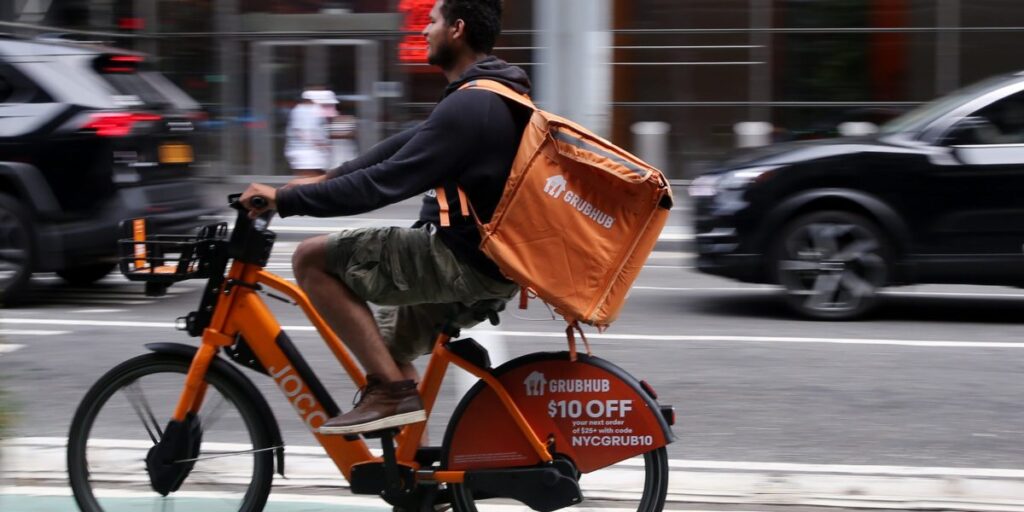Brad Lander is New York City’s Comptroller.
When New Yorkers order their late-night Chinese food or lunch salad through a delivery app, the food shows up just minutes later, but it’s not magic, technology or a billion-dollar app company that brings it all: It’s people.
Unfortunately, despite cruising through rain, snow, heat, and New York City traffic, delivery workers, or “deliverists,” are often treated as little more than human by the businesses that rely on them. Some restaurants refuse to let workers use their restrooms during long shifts. The apps’ payment algorithms pressure them to deliver meals to the other side of Manhattan in just minutes, resulting in one of the highest fatality rates of any job here.
And until recently, delivery workers were paid less than the minimum wage, in some places as little as $6 an hour. So last year, New York City became the first city in the nation to tackle this issue, and I was proud to sponsor a minimum wage bill in the City Council that would raise the minimum wage for delivery workers to $17.96 an hour.
This rate, barely above the minimum wage in New York, won’t make anyone wealthy, but it will at least guarantee these hardworking workers a minimum income.
Unfortunately, Uber, DoorDash, and Grubhub are doing their best to ruin even that: They’ve filed unsuccessful lawsuits, lobbied city hall relentlessly, and then made tipping even more confusing for customers.
That’s not surprising. They did the same thing in 2018 when a law I introduced in the City Council to guarantee a minimum wage for Uber and Lyft drivers passed. The companies attacked the law through lobbying, public relations, and lawsuits. They sent push notifications to drivers and customers spreading false information, including threats to shut down the companies, just as they are doing now in Minneapolis, where the City Council passed a similar bill.
But the law is working. Six years later, Uber and Lyft are growing strong in New York. As of March 2024, New Yorkers and tourists recorded 686,475 Uber and Lyft rides per day, the highest number yet recorded since the pandemic. It’s estimated that the app companies are making more than $1 million per day here.
For drivers, the difference is big: “New York drivers are earning more per hour, and on average, few are forgoing Uber or Lyft for any given trip, and companies are likely seeing better business outcomes,” according to the analysis.
Similarly, there is no evidence that a minimum wage for delivery workers would have a negative impact on customers. Uber Eats, DoorDash, and Grubhub averaged about 2.6 million deliveries per week before and after the rate increase combined.
So in their next argument, the apps blame these marginal wage increases on inflation. You might think it was supply chain disruptions, pandemic stimulus checks, or greed flation. But no, some say it’s delivery workers and Uber drivers demanding to be treated like humans.
Blaming inflation on the minimum wage is a typical claim made by billionaires who are ignorant of reality, but it’s nonsense.
As New York City’s Comptroller, I analyze our city’s economy, and the data shows that raising the minimum wage for minimum wage workers floats a lot of boats, which is exactly what happened when New York gradually raised its minimum wage to $15 an hour between 2013 and 2019.
Employment in sectors with a high proportion of minimum wage workers, such as fast food, increased by 31% in New York City, well above the 20% average in 12 U.S. cities that did not raise the minimum wage at the time.
Incomes for minimum wage earners increased by 50 percent, and the poverty rate for those households fell by 7 percent. As jobs and incomes increased, so did the opening of new restaurants and hotels.
Raising the minimum wage to $15 provided economic stability to hundreds of thousands of low-wage New Yorkers. The 2018 law did the same for Uber drivers, and the new law will do the same for delivery workers, who have been a critical lifeline during the pandemic and continue to provide an essential service.
It’s no surprise that app companies are blaming inflation on their own low-wage workers and selling ridiculous contracts. They’re trying to squeeze every penny they can out of the delivery people they rely on to boost their profits. That’s the gig business model. And they’re targeting more and more of us.
But the data is clear: helping low-wage workers earn a livable income is good for the economy. Don’t believe the “divide and conquer” nonsense that tells you otherwise.
The workers who put food on our tables should be able to put food on their own tables.
More must-read commentary from Fortune:
Opinions expressed in commentary articles on Fortune.com are solely those of their authors and do not necessarily reflect the opinions or beliefs of Fortune.


